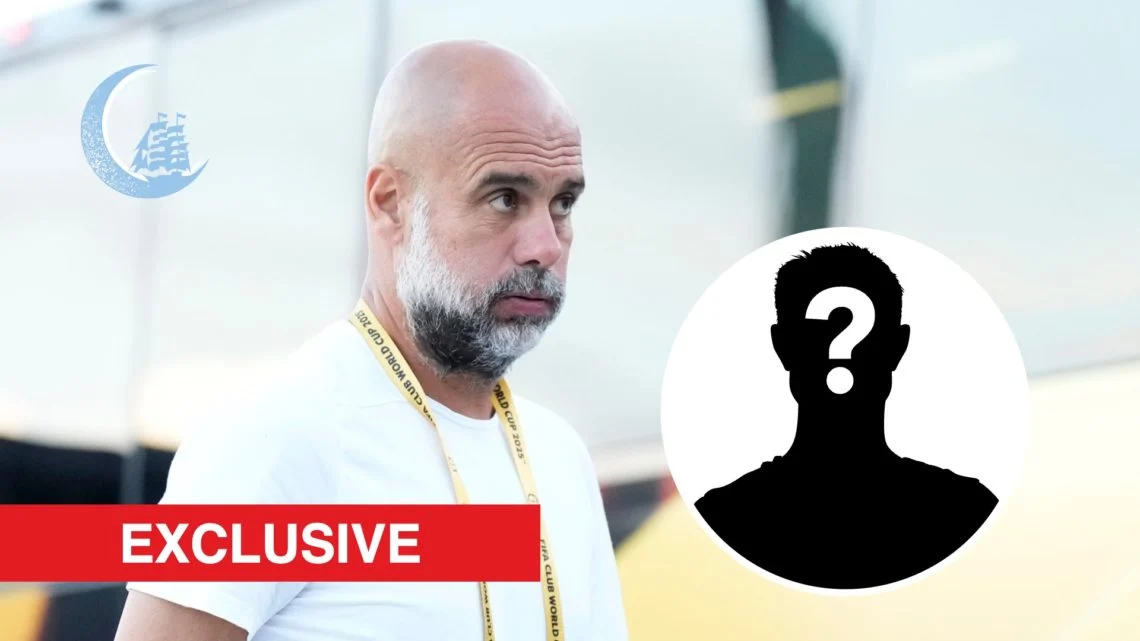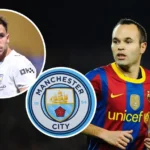£50m star ready to leave Manchester City just months after joining Pep Guardiola’s squad

Manchester City’s transfer policy has been the cornerstone of their sustained success over the past decade and a half. Since the transformative takeover by their Abu Dhabi owners in 2008, the club has consistently demonstrated shrewd judgment in the transfer market, rarely making investments that fail to yield returns. However, the case of Nico Gonzalez, the £50 million midfielder acquired from FC Porto in January 2025, presents a fascinating study in how quickly circumstances can change in modern football.
The 23-year-old Spanish midfielder’s situation at the Etihad Stadium has become increasingly precarious, with reports suggesting that intermediaries are already exploring potential exits across Europe and Saudi Arabia. This development comes just months after his arrival, raising questions about whether City’s typically meticulous transfer strategy may have encountered an unexpected obstacle.
The winter transfer window of 2025 presented Manchester City with unique challenges. The club found themselves in a position where immediate reinforcement was necessary to salvage their season, particularly in the crucial defensive midfield position. The absence of Rodri, their lynchpin in the middle of the park, had exposed vulnerabilities that needed urgent addressing.
Pep Guardiola, known for his tactical flexibility and ability to adapt his squad to different situations, identified the need for a player who could step into Rodri’s role and provide the stability that had been missing. The search led them to Nico Gonzalez, who had been impressing at FC Porto with his composed performances and technical ability.
The £50 million investment represented a significant commitment from City, demonstrating their belief in Gonzalez’s potential to fill the void left by Rodri’s absence. The transfer was completed with the expectation that the Spanish midfielder would provide both immediate impact and long-term value to the squad.
However, the circumstances surrounding the January transfer window were markedly different from City’s typical summer recruitment drives. The pressure to secure results and maintain their competitive position across multiple competitions meant that decisions had to be made more quickly than usual, potentially without the extensive scouting and analysis that typically characterizes their transfer activity.
The summer of 2025 brought significant changes to Manchester City’s midfield landscape with the arrival of Tijjani Reijnders. The Dutch midfielder’s acquisition has fundamentally altered the dynamics within Guardiola’s squad, creating a ripple effect that has directly impacted Gonzalez’s standing within the team.
Reijnders’ impact has been immediate and profound. His ability to contribute both defensively and offensively has made him an attractive option for Guardiola, who has been seeking solutions to break down stubborn defensive setups that plagued City throughout the previous season. The Dutch international’s versatility and goal-scoring threat from midfield positions have quickly established him as a key figure in the manager’s plans.
The statistical comparison between Gonzalez and Reijnders reveals telling differences in their contributions. While Gonzalez managed 9 goals and 6 assists in 46 appearances during the 2024-25 season, Reijnders exceeded these numbers with 15 goals and 5 assists in 57 games. More importantly, Reijnders’ ability to arrive in the opposition box and create goalscoring opportunities has addressed one of Guardiola’s primary concerns about his team’s attacking output.
This development has created a hierarchical shift within City’s midfield structure. With Rodri remaining the undisputed first-choice defensive midfielder and Reijnders quickly establishing himself as the preferred box-to-box option, Gonzalez finds himself relegated to a peripheral role that offers limited opportunities for regular playing time.
To understand Gonzalez’s predicament, it’s essential to examine how he fits within Guardiola’s tactical framework. The Spanish midfielder possesses many of the qualities that the City manager traditionally values: technical proficiency, positional awareness, and the ability to maintain possession under pressure. His background and playing style suggest a player molded in the Barcelona tradition, sharing the DNA that Guardiola holds dear.
However, the modern iteration of Guardiola’s system has evolved to demand more from midfield players in terms of direct attacking contribution. The coach’s recent emphasis on breaking down low defensive blocks has led to a preference for players who can provide goal threats from central positions. This tactical evolution has worked against Gonzalez, whose strengths lie more in the foundational aspects of midfield play rather than in the final third.
The comparison with Rodri is particularly instructive. While both players excel in similar areas – possession retention, tempo control, and defensive positioning – Rodri’s established relationship with the team and his proven ability to perform at the highest level make him the natural choice when fit. This leaves Gonzalez competing for a role that requires different attributes from those he naturally possesses.
Guardiola’s tactical flexibility has always been one of his greatest strengths, but it also means that players must adapt quickly to changing requirements. The introduction of Reijnders has provided the manager with an option that combines defensive solidity with attacking threat, effectively reducing the need for a pure defensive midfielder as a backup to Rodri
The FIFA Club World Cup provided a crucial testing ground for Gonzalez to demonstrate his value to the squad. However, his limited playing time – just 61 minutes across the tournament – sent a clear message about his standing within the team hierarchy. This minimal involvement in a competition that typically offers opportunities for squad rotation suggests that Guardiola’s faith in the midfielder has already begun to wane.
The Club World Cup experience highlighted the reality of Gonzalez’s situation. Despite being a significant investment made just months earlier, he found himself unable to secure meaningful playing time even in circumstances that would normally favor squad rotation. This development has undoubtedly influenced the growing speculation about his future at the club.
The tournament also provided an opportunity to observe how Reijnders has integrated into the team structure. The Dutch midfielder’s impact during the competition further emphasized the contrast between his immediate acceptance into Guardiola’s plans and Gonzalez’s struggle to establish himself as a regular option.
The involvement of intermediaries in exploring potential exits for Gonzalez reflects the pragmatic approach that modern football demands. With the player’s situation becoming increasingly clear, both the club and the player’s representatives are working to identify solutions that could benefit all parties involved.
The interest from clubs across Europe and Saudi Arabia indicates that Gonzalez’s reputation remains intact despite his limited impact at City. His performances at Porto and his technical qualities continue to attract attention from clubs seeking midfield reinforcement. The Saudi Arabian interest, in particular, represents a lucrative option that could provide both the player and City with favorable terms for a potential transfer.
European clubs offer the appeal of continued development at the highest level, while the Saudi option presents significant financial incentives. The diversity of interest suggests that Gonzalez’s career prospects remain bright, regardless of his current situation at City.
Manchester City’s willingness to consider offers for Gonzalez demonstrates their pragmatic approach to squad management. Rather than persisting with a player who doesn’t fit their current tactical requirements, they appear ready to cut their losses and reinvest in alternatives that better suit their needs.
The potential departure of Gonzalez represents a significant financial consideration for Manchester City. The £50 million investment made in January would likely result in a substantial loss if the player is sold during the summer window. This financial impact extends beyond the immediate transfer fee to include wages, agent fees, and other associated costs.
However, City’s financial position allows them to absorb such losses without significant impact on their operational capacity. The club’s revenue streams and financial backing mean that the Gonzalez situation, while unfortunate, won’t prevent them from making necessary reinforcements to their squad.
The situation also highlights the risks inherent in January transfers. The pressure to make quick decisions during the winter window can lead to investments that might not align with longer-term strategic planning. While City’s track record in this regard has been generally positive, the Gonzalez case serves as a reminder that even the most sophisticated recruitment operations can encounter unexpected challenges.
From Gonzalez’s perspective, the situation at Manchester City presents both challenges and opportunities. The limited playing time threatens to impact his development and international prospects, making a move potentially beneficial for his career trajectory. At 23, he remains at a crucial stage of his development where regular playing time is essential for continued growth.
The midfielder’s professional approach to his reduced role has been noted by observers, suggesting a mature understanding of his situation. This attitude could prove valuable in securing a move to a club where he can play a more prominent role and continue his development.
The Spanish international’s technical qualities and age profile make him an attractive proposition for clubs seeking midfield reinforcement. His experience at Porto and brief stint at City provide valuable credentials that could facilitate a successful transition to a new environment.
The Gonzalez situation offers insights into the evolution of transfer strategy in modern football. The increasing pace of the game and the rapid changes in tactical requirements mean that players must adapt quickly to new environments and expectations. Those who fail to do so risk finding themselves surplus to requirements, regardless of their underlying quality.
Manchester City’s approach to this situation will be closely watched by other clubs and industry observers. Their handling of the Gonzalez case could set precedents for how top clubs manage similar situations in the future. The willingness to acknowledge a miscalculation and take corrective action demonstrates the kind of decisive leadership that has contributed to City’s success.
The case also highlights the importance of cultural and tactical fit in modern transfers. Technical ability alone is no longer sufficient; players must also align with the specific requirements of their new club’s playing style and tactical approach. This reality places additional pressure on recruitment departments to ensure comprehensive evaluation of potential signings.
As the summer transfer window progresses, the Gonzalez situation will likely reach a resolution. The player’s representatives and Manchester City are working to identify a solution that serves everyone’s interests. The diversity of options available suggests that a suitable arrangement can be found.
For Manchester City, resolving the Gonzalez situation will allow them to focus on other transfer priorities. Guardiola’s desire to strengthen his squad in specific areas means that freed-up resources could be redirected toward players who better fit the team’s tactical requirements.
The timeline for any potential transfer will be influenced by various factors, including the interested clubs’ financial capacity, competitive schedules, and the player’s own preferences. However, the momentum toward a resolution appears to be building, with multiple parties working toward a mutually beneficial outcome.
The Gonzalez experience provides valuable lessons for Manchester City’s recruitment strategy. The case demonstrates the importance of maintaining long-term strategic vision even when faced with short-term pressures. January transfers, while sometimes necessary, carry inherent risks that must be carefully weighed against potential benefits.
The situation also underscores the importance of tactical alignment in recruitment decisions. Technical quality must be balanced with tactical fit, cultural adaptation, and strategic need. This holistic approach to recruitment has generally served City well, and the Gonzalez case reinforces the importance of maintaining these standards.
Future recruitment decisions will likely benefit from the insights gained from this experience. The club’s ability to learn from setbacks and adapt their approach accordingly has been a key factor in their sustained success, and this situation provides another opportunity for refinement and improvement.
The Nico Gonzalez situation at Manchester City represents a temporary setback rather than a fundamental failure of their transfer strategy. The unique circumstances surrounding his January acquisition, combined with the subsequent arrival of Tijjani Reijnders, have created a perfect storm that has marginalized the Spanish midfielder’s role within the squad.
While the financial implications of his potential departure are significant, they are not insurmountable for a club of City’s resources. More importantly, the situation demonstrates the club’s willingness to make difficult decisions when circumstances require it, rather than persisting with arrangements that no longer serve their interests.
For Gonzalez, the situation presents an opportunity to restart his career in an environment where he can play a more prominent role. His technical qualities and professional approach suggest that he can succeed elsewhere, potentially vindicating the original assessment of his abilities.
The coming weeks will likely see a resolution to this situation, with all parties working toward an outcome that serves their respective interests. While the Gonzalez case may not have unfolded as originally planned, it provides valuable insights into the complexities of modern football transfers and the importance of adaptability in an ever-changing landscape.
Manchester City’s approach to resolving this situation will be closely watched, as it could influence how similar cases are handled in the future. Their reputation for pragmatic decision-making and strategic thinking suggests that they will find a solution that minimizes the negative impact while positioning themselves for continued success.
The Gonzalez saga serves as a reminder that even the most successful clubs must occasionally navigate unexpected challenges. How they respond to these challenges often defines their long-term trajectory, and City’s handling of this situation will be another test of their organizational resilience and strategic acumen.















